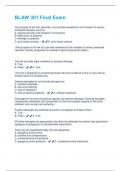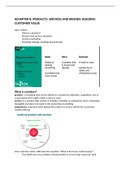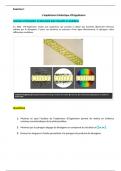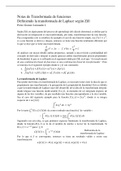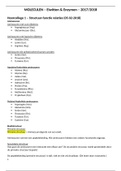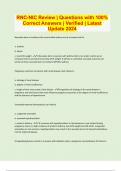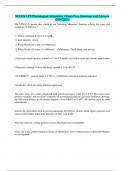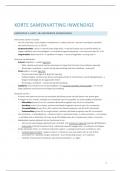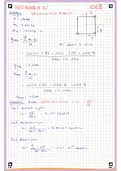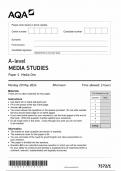The purpose of tort law, generally, is to provide remedies for the invasion of various
protected interests, such as:
A. physical security and freedom of movement.
B. destruction of property.
C. damage to property.
D. all of these choices. - ✔️✔️D. all of these choices.
(The purpose of tort law is to provide remedies for the violation of various protected
interests. Society recognizes an interest in personal physical safety.)
Tort law provides legal remedies for property damage.
A. True
B. False - ✔️✔️A. True
(Tort law is designed to compensate those who have suffered a loss or injury due to
another person's wrongful act.)
General damages do not include damages for:
A. medical expenses.
B. pain and suffering.
C. loss of reputation.
D. loss of physical capacity. - ✔️✔️A. medical expenses.
(Damages for the loss of physical capacity are general damages. General damages
compensate individuals (not companies) for the nonmonetary aspects of the harm
suffered, such as pain and suffering.)
Punitive damages are intended to punish a wrongdoer and deter others.
A. True
B. False - ✔️✔️A. True
(Punitive damages are appropriate only when the defendant's conduct was particularly
egregious (outrageous) or reprehensible (shameful).)
Torts may be classified broadly into two categories:
A. egregious and punitive.
B. punitive and compensatory.
C. unintentional and intentional.
D. egregious and intentional. - ✔️✔️C. unintentional and intentional.
,(The classification of a particular tort depends largely on how the tort occurs
(intentionally or negligently) and the surrounding circumstances.)
Tort is the French word for:
A. late.
B. pie.
C. court.
D. wrong. - ✔️✔️D. wrong.
Negligence is classified as:
A. a punitive tort.
B. an intentional tort.
C. an unintentional tort.
D. an indefensible tort. - ✔️✔️C. an unintentional tort.
(Intentional torts result from the intentional violation of person or property (fault plus
intent). Negligence results from the breach of a duty to act reasonably (fault without
intent).)
The two notions that serve as the basis of all torts are:
A. damages and suffering.
B. injury and suffering.
C. wrongs and compensation.
D. none of these choices. - ✔️✔️C. wrongs and compensation.
(Two notions serve as the basis of all torts: wrongs and compensation. Tort law is
designed to compensate those who have suffered a loss or injury due to another
person's wrongful act. While some type of injury/damage is required to receive
compensation, suffering is not.)
There are no legally recognized defenses in a tort lawsuit.
A. True
B. False - ✔️✔️B. False
(There are several defenses that could apply in a tort case, such as consent,
comparative negligence, or the statute of limitations.)
In tort actions, plaintiffs may seek two kinds of damages:
A. punitive and compensatory.
B. compensatory and special.
C. compensatory and general.
D. punitive and special. - ✔️✔️A. punitive and compensatory.
, (A plaintiff is awarded compensatory damages to compensate or reimburse the plaintiff
for actual losses. The courts also award punitive damages in tort cases to punish the
wrongdoer and deter others from similar wrongdoing.)
The basic purpose of tort law is to:
A. ensure that Congress does not overstep its legal authority.
B. provide remedies for the invasion of protected interests.
C. punish criminal wrongdoers.
D. make sure that citizens follow appropriate immigration regulations. - ✔️✔️B. provide
remedies for the invasion of protected interests.
(The basic purpose of tort law is to provide remedies when legally protected interests
have been invaded. Criminal law addresses the issues of people who violate criminal
laws.)
Punitive damages to plaintiffs in tort actions are limited:
A. only when negligence lawsuits are involved.
B. only if intentional tort actions are involved.
C. by due process mandated in the Constitution.
D. only if both gross negligence and intentional tort action are involved. - ✔️✔️C. by
due process mandated in the Constitution.
(Punitive damages are limited by the due process clause of the U.S. Constitution.)
The purpose of tort law is to provide remedies when various protected interests have
been invaded.
A. True
B. False - ✔️✔️A. True
(Tort law provides remedies for acts that cause physical injury or that interfere with
physical security and freedom of movement.)
Special damages compensate the plaintiff for things such as:
A. impairment of physical capacity.
B. costs of repairing damaged property.
C. emotional pain and suffering.
D. loss of companionship. - ✔️✔️B. costs of repairing damaged property.
(Special damages compensate the plaintiff for quantifiable monetary losses, such as
medical expenses and lost wages and benefits (now and in the future). Special
damages might also be awarded to compensate for extra costs, the loss of irreplaceable
items, and the costs of repairing or replacing damaged property.)
A statute of limitations:
A. limits the time period during which a plaintiff can successfully file a tort lawsuit
against a defendant.

